
 |
|
Closer (2004) Cast: Jude Law, Natalie Portman, Julia Roberts, Clive Owen 2004 – 102 minutes Rated: Reviewed by Dustin Putman, November 29, 2004. 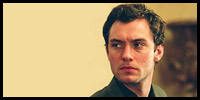 "Closer," directed with a surgical workmanlike quality by Mike Nichols (2000's "What Planet Are You From?"), is a motion picture of starts and stops—not involving the pacing, which is slow but always absorbing, but within the horribly dysfunctional relationships between its four characters. Supporting roles are defunct, the film taking place in a self-contained bubble in which other people live, but, for all intents and purposes, do not exist outside of being window dressing. What is left are these four souls—obituary writer Dan (Jude Law), young stripper Alice (Natalie Portman), photographer Anna (Julia Roberts), and dermatologist Larry (Clive Owen)—who seemingly choose destruction over happiness, meeting cute in sequences that would be right at home in the romantic comedy genre before the movie switches to the end of their romances when passion and emotional connection is gone. Their behavior is inexcusable and, at times, downright maddening. In their own way, however, and whether viewers are willing to admit it or now, they begin to take on patterns and make very bad choices that resemble one's we have all made—or, at least, considered—in our own past.
"Closer," directed with a surgical workmanlike quality by Mike Nichols (2000's "What Planet Are You From?"), is a motion picture of starts and stops—not involving the pacing, which is slow but always absorbing, but within the horribly dysfunctional relationships between its four characters. Supporting roles are defunct, the film taking place in a self-contained bubble in which other people live, but, for all intents and purposes, do not exist outside of being window dressing. What is left are these four souls—obituary writer Dan (Jude Law), young stripper Alice (Natalie Portman), photographer Anna (Julia Roberts), and dermatologist Larry (Clive Owen)—who seemingly choose destruction over happiness, meeting cute in sequences that would be right at home in the romantic comedy genre before the movie switches to the end of their romances when passion and emotional connection is gone. Their behavior is inexcusable and, at times, downright maddening. In their own way, however, and whether viewers are willing to admit it or now, they begin to take on patterns and make very bad choices that resemble one's we have all made—or, at least, considered—in our own past.
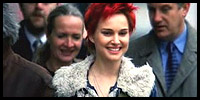 As the picture begins, Dan witnesses the self-described waif, Alice, get hit by a car while crossing a busy London street. Taking her the hospital to get treated for some scrapes and bruises, they begin to talk and soon have fallen in love. Switch forward a year, Dan shares a passionate kiss with stranger Anna, who has been chosen to photograph him for his impending book release. They go no further than this, but meet another year later at Anna's photography exhibit, where feelings for each other are discovered to still be mutual. By this time, Anna is in a serious relationship with Larry, whom Dan unknowingly brought together through a thought-to-be-harmless sex chat deception where he posed as Anna. As couples break up in exchange for new relationships that, they discover, offer no more satisfaction than the one's they were already in, Alice eventually has a sexual encounter with the rejected Larry at a strip club she works at.
As the picture begins, Dan witnesses the self-described waif, Alice, get hit by a car while crossing a busy London street. Taking her the hospital to get treated for some scrapes and bruises, they begin to talk and soon have fallen in love. Switch forward a year, Dan shares a passionate kiss with stranger Anna, who has been chosen to photograph him for his impending book release. They go no further than this, but meet another year later at Anna's photography exhibit, where feelings for each other are discovered to still be mutual. By this time, Anna is in a serious relationship with Larry, whom Dan unknowingly brought together through a thought-to-be-harmless sex chat deception where he posed as Anna. As couples break up in exchange for new relationships that, they discover, offer no more satisfaction than the one's they were already in, Alice eventually has a sexual encounter with the rejected Larry at a strip club she works at.
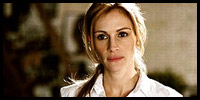 Written by Patrick Marber (based on his play), "Closer" is destined to elicit deep conversations for anyone who sees it. It is not an easy film to embrace, despite grabbing the viewer's attention from the beginning and refusing to let go, because it features four characters who start off likable before becoming more despicable with each new scene. They are all self-destructive, yes, but they are also hypocrites in the biggest sense, willing to have affairs and give in to temptations even as they resent their partners who all, at some point, do they very same thing. Black as coal and uncompromisingly grim, "Closer" is an arresting drama in the vein of filmmaker Neil LaBute's oeuvre (1998's "Your Friends & Neighbors," 2003's "The Shape of Things") that just so happens to involve an insufferable lot who, if they existed in your real life, you would walk on the opposite side of the street to avoid. In certain actions, they, indeed, symbolize the darker side of common human nature. By the end, they have sunken to an even lower level that is difficult to apprehend, let alone understand.
Written by Patrick Marber (based on his play), "Closer" is destined to elicit deep conversations for anyone who sees it. It is not an easy film to embrace, despite grabbing the viewer's attention from the beginning and refusing to let go, because it features four characters who start off likable before becoming more despicable with each new scene. They are all self-destructive, yes, but they are also hypocrites in the biggest sense, willing to have affairs and give in to temptations even as they resent their partners who all, at some point, do they very same thing. Black as coal and uncompromisingly grim, "Closer" is an arresting drama in the vein of filmmaker Neil LaBute's oeuvre (1998's "Your Friends & Neighbors," 2003's "The Shape of Things") that just so happens to involve an insufferable lot who, if they existed in your real life, you would walk on the opposite side of the street to avoid. In certain actions, they, indeed, symbolize the darker side of common human nature. By the end, they have sunken to an even lower level that is difficult to apprehend, let alone understand.
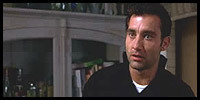 The performances, free of vanity, and the juicy, at times sexually explicit, dialogue they throw off each other are the key reasons why "Closer" remains a film worth noting. The actors are near the top of their game as they tackle difficult characters to wrap around, with Julia Roberts (2003's "Mona Lisa Smile") probably surprising the most with the amount of unaffected depth she brings to Anna through her facial expressions and line deliveries. Having such a huge star in a film outside of the mainstream realm always runs the risk of calling attention to itself, but Roberts so magnificently embodies the whole of Anna that she avoids this trap. As Alice, who seems at the onset to be the most virtuous of the leads before late developments prove this to might not be the case, Natalie Portman delivers her second stunning, nuanced performance of the year, following "Garden State." At only 23, Portman is able to bring a lived-in soulfulness to Alice that someone twice her age would likely have trouble equaling. As male counterparts Larry and Dan, Clive Owen (2002's "The Bourne Identity") and Jude Law (2004's "Alfie") offer intensely good turns of their own. If there is a debit, it is that Law's recent overexposure—by the end of the year, he will have appeared in six high-profile movies in a four-month span—has grown tiresome. No fault of Law's, but his undeniably pretty face has begun to wear out its welcome.
The performances, free of vanity, and the juicy, at times sexually explicit, dialogue they throw off each other are the key reasons why "Closer" remains a film worth noting. The actors are near the top of their game as they tackle difficult characters to wrap around, with Julia Roberts (2003's "Mona Lisa Smile") probably surprising the most with the amount of unaffected depth she brings to Anna through her facial expressions and line deliveries. Having such a huge star in a film outside of the mainstream realm always runs the risk of calling attention to itself, but Roberts so magnificently embodies the whole of Anna that she avoids this trap. As Alice, who seems at the onset to be the most virtuous of the leads before late developments prove this to might not be the case, Natalie Portman delivers her second stunning, nuanced performance of the year, following "Garden State." At only 23, Portman is able to bring a lived-in soulfulness to Alice that someone twice her age would likely have trouble equaling. As male counterparts Larry and Dan, Clive Owen (2002's "The Bourne Identity") and Jude Law (2004's "Alfie") offer intensely good turns of their own. If there is a debit, it is that Law's recent overexposure—by the end of the year, he will have appeared in six high-profile movies in a four-month span—has grown tiresome. No fault of Law's, but his undeniably pretty face has begun to wear out its welcome.
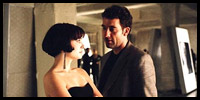 Each sequence in "Closer" is something of a war of words that make up individual short features, all of them provocative and gripping. There are genuinely sweet moments early on, including the day Dan and Alice share together as they walk around the city following her accident, and another scene in which Anna and Larry awkwardly meet by chance at an aquarium and share an almost instant bond. For the most part, though, the film's tone is somber and downright brutal, as in the confrontation between Larry and Anna when she tells him she's leaving him for Dan, their damaging honesty cutting each other like knives. Another sequence between Larry and Alice in the backroom of the strip club is a bravura ten minutes of sharply written and acted precision, as they dance around the real subjects at hand and tempt each other as a respite to their failed relationships with Anna and Dan.
Each sequence in "Closer" is something of a war of words that make up individual short features, all of them provocative and gripping. There are genuinely sweet moments early on, including the day Dan and Alice share together as they walk around the city following her accident, and another scene in which Anna and Larry awkwardly meet by chance at an aquarium and share an almost instant bond. For the most part, though, the film's tone is somber and downright brutal, as in the confrontation between Larry and Anna when she tells him she's leaving him for Dan, their damaging honesty cutting each other like knives. Another sequence between Larry and Alice in the backroom of the strip club is a bravura ten minutes of sharply written and acted precision, as they dance around the real subjects at hand and tempt each other as a respite to their failed relationships with Anna and Dan.
 If "Closer" is superb in sections, it all adds up to much less as a whole. By focusing solely on the characters' key encounters with each other—in order, Dan and Alice, Dan and Anna, Anna and Alice, Anna and Larry, Alice and Larry, and Larry and Dan—director Mike Nichols has neglected to delve into who these people truly are and why they do what they do. Perhaps his point is that there is no point to what Dan, Alice, Anna, and Larry do—they are the biggest victims of their own indiscretions—but it makes for a slightly disconcerting cinematic outcome. "Closer" doesn't offer much audience satisfaction because they are placed in the character's terminally unsatisfied shoes, but it does welcome, and even demand, conversation and post-screening discussions. The film is an uncompromising experience, which proves to be a simultaneous detriment and godsend to the finished product, but the sumptuous performances and tantalizing dialogue make even the most detestable of human behavior uncontrollably fascinating.
If "Closer" is superb in sections, it all adds up to much less as a whole. By focusing solely on the characters' key encounters with each other—in order, Dan and Alice, Dan and Anna, Anna and Alice, Anna and Larry, Alice and Larry, and Larry and Dan—director Mike Nichols has neglected to delve into who these people truly are and why they do what they do. Perhaps his point is that there is no point to what Dan, Alice, Anna, and Larry do—they are the biggest victims of their own indiscretions—but it makes for a slightly disconcerting cinematic outcome. "Closer" doesn't offer much audience satisfaction because they are placed in the character's terminally unsatisfied shoes, but it does welcome, and even demand, conversation and post-screening discussions. The film is an uncompromising experience, which proves to be a simultaneous detriment and godsend to the finished product, but the sumptuous performances and tantalizing dialogue make even the most detestable of human behavior uncontrollably fascinating.
|
© 2004 by Dustin Putman |














